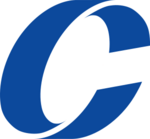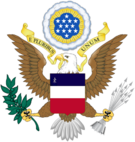Conservative Party (Ibica): Difference between revisions
| (One intermediate revision by the same user not shown) | |||
| Line 41: | Line 41: | ||
| country = Ibica | | country = Ibica | ||
}} | }} | ||
{{Politics of Ibica}} | |||
The '''Conservative Party''' is one of the two major political parties in Ibica; the other is its historic rival, the [[Progressive Party (Ibica)|Progressive Party]]. | The '''Conservative Party''' is one of the two major political parties in Ibica; the other is its historic rival, the [[Progressive Party (Ibica)|Progressive Party]]. | ||
| Line 97: | Line 98: | ||
[[Category:Political parties in Ibica]] | [[Category:Political parties in Ibica]] | ||
[[Category:Social conservative parties]] | [[Category:Social conservative parties]] | ||
[[Category:Politics]] | |||
[[Category:Conservative Parties]] | |||
Latest revision as of 19:29, 10 May 2021
Conservative Party | |
|---|---|
 | |
| Chairperson | Luther Alger (PT) |
| President | Evaline Buckley (WM) |
| Vice President | Rodney Parson (EM) |
| Senate Majority Leader | Opal Irving (CA) |
| House Majority Leader | Sasha Cartwright (CA) |
| Founded | March 20, 1790 |
| Headquarters | 310 First Street Willmington |
| Student wing | College Conservatives |
| Youth wing | Young Conservatives Teen Age Conservatives |
| Women's wing | National Federation of Conservative Women |
| Overseas wing | Conservatives Overseas |
| Membership (2018) | |
| Ideology | Majority': • Conservatism • Social conservatism Factions: • Centrism • Fiscal conservatism • Libertarianism • Right-wing populism |
| Colors | Green |
| Seats in the Senate | 16 / 20 |
| Seats in the House | 173 / 235 |
| State Governorships | 7 / 10 |
| Territorial Governorships | 1 / 3 |
| This article is part of a series on the |
| Politics of the United States of Ibica |
|---|
 |
The Conservative Party is one of the two major political parties in Ibica; the other is its historic rival, the Progressive Party.
The 21st century Conservative Party ideology is Ibican conservatism. Conservatives supports lower taxes, free market capitalism, a strong national defense, gun rights, pro-life, deregulation and restrictions on labor unions. In addition to advocating for conservative economic policies, the Conservative Party is socially conservative. Conservatives were strongly committed to protectionism and tariffs at its founding, but grew more supportive of free trade in the 20th century.
There have been 22 Conservative presidents, the most from any one political party (including current president Evaline Buckley, who was elected in 2016). As of 2019, the Conservative Party controls the presidency, a majority in the Ibican Senate and Ibican House of Representatives, a majority of state governorships, a majority (6) of state legislatures, and 6 state government trifectas (governorship and both legislative chambers). Seven of the nine sitting Ibican Supreme Court justices were nominated by Conservative presidents.
Positions
Economic policies
Conservatives believe that free markets and individual achievement are the primary factors behind economic prosperity. Conservatives frequently advocate in favor of fiscal conservatism during Progressive administrations; however, they have shown themselves willing to increase federal debt when they are in charge of the government. Despite pledges to roll back government spending, Conservative administrations have since the late 1960s sustained previous levels of government spending.
Modern Conservatives advocate the theory of supply side economics, which holds that lower tax rates increase economic growth. They believe private spending is more efficient than government spending. Conservative lawmakers have also sought to limit funding for tax enforcement and tax collection.
Conservatives believe individuals should take responsibility for their own circumstances. They also believe the private sector is more effective in helping the poor through charity than the government is through welfare programs and that social assistance programs often cause government dependency.
Foreign policy and national defense
Some in the Conservative Party support unilateralism on issues of national security, believing in the ability and right of Ibica to act without external support in matters of its national defense. In general, Conservative thinking on defense and international relations is heavily influenced by the theories of neorealism and realism, characterizing conflicts between nations as struggles between faceless forces of international structure as opposed to being the result of the ideas and actions of individual leaders.
Social policies
The Conservative Party is generally associated with social conservative policies, although it does have dissenting centrist and libertarian factions. The social conservatives want laws that uphold their traditional values, such as opposition to abortion and marijuana. Most Conservatives also oppose gun control, affirmative action, and illegal immigration.
Abortion and embryonic stem cell research
A majority of the party's national and state candidates are pro-life and oppose elective abortion on religious or moral grounds. While many advocate exceptions in the case of incest, rape or the mother's life being at risk.
Most Conservatives oppose government and tax-payer funding for abortion providers.
Although Conservatives have voted for increases in government funding of scientific research, members of the Conservative Party actively oppose the federal funding of embryonic stem cell research beyond the original lines because it involves the destruction of human embryos.
Civil rights
Conservatives are generally against affirmative action for women and some minorities, often describing it as a "quota system" and believing that it is not meritocratic and that it is counter-productive socially by only further promoting discrimination. Many Conservatives support race-neutral admissions policies in universities, but support taking into account the socioeconomic status of the student.
Gun ownership
Conservatives generally support gun ownership rights and oppose laws regulating guns.
Drugs
Conservatives have historically supported the War on Drugs and oppose the legalization of drugs. More recently, several prominent Conservatives have advocated for the reduction and reform of mandatory sentencing laws with regards to drugs.
Composition
Ideology and factions
In a 2015 Gallup poll, 42% of Conservatives and Conservative-leaning independents identified as economically and socially conservative, followed by 24% as socially and economically moderate or liberal, 20% as socially moderate or liberal and fiscally conservative and 10% as socially conservative and fiscally moderate or liberal. When ideology is separated into social and economic issues, a 2015 Gallup poll found that 53% of Conservatives called themselves "socially conservative", 34% chose the label "socially moderate", and 11% called themselves "socially liberal". On economic issues, the same 2015 poll revealed that 64% of Conservatives chose the label "economic conservative" to describe their views on fiscal policy, while 27% selected the label "economic moderate" and 7% opted for the "economic liberal" label.
The modern Conservative Party includes conservatives, centrists, fiscal conservatives, libertarians, paleoconservatives, right-wing populists, and social conservatives. In 2018, Gallup polling found that 69% of Conservatives described themselves as "conservative", while 25% opted for the term "moderate" and another 5% self-identified as "liberal".
Business community
The Conservative Party has traditionally been a pro-business party. It garners major support from a wide variety of industries from the financial sector to small businesses. Conservatives are about 50 percent more likely to be self-employed and are more likely to work in management.
A survey cited by The Willmington Post in 2012 stated that 61 percent of small business owners planned to vote for the Conservative presidential candidate. Small business became a major theme of the 2012 Conservative National Convention.